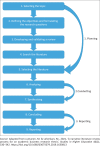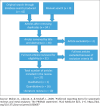Strategies to address conspiracy beliefs and misinformation on COVID-19 in South Africa: A narrative literature review
- PMID: 36483504
- PMCID: PMC9723965
- DOI: 10.4102/hsag.v27i0.1851
Strategies to address conspiracy beliefs and misinformation on COVID-19 in South Africa: A narrative literature review
Abstract
Conspiracy theories and misinformation have been explored extensively however, strategies to minimise their impact in the context of coronavirus disease 2019 (COVID-19) vaccines are limited. This study aimed to explore strategies that can be used to reduce the negative effects of conspiracies and misinformation about SARS-CoV-2. This review was carried out based on accessed literature on beliefs in misinformation about the COVID-19 pandemic. A comprehensive search of databases, such as Google Scholar, EBSCOhost and African Journals between 2019 and 2022 yielded qualitative and quantitative studies. Two themes emerged, namely underlying motives for conspiracy theories and belief in misinformation about the pandemic and ways to overcome them. The latter included: (1) strengthening critical scanning of information, (2) critical review to address misinformation and (3) establishing approaches for managing conspiracy theories. A proposal is made to address conspiracy beliefs about COVID-19 infection.
Contribution: This is believed to be the first review that describes strategies to mitigate belief in conspiracies and misinformation to promote vaccination.
Keywords: COVID-19; address; conspiracy; misinformation; strategies; vaccines.
© 2022. The Authors.
Conflict of interest statement
The author declares that they have no financial or personal relationships that may have inappropriately influenced them in writing this article.
Figures
Similar articles
-
Patterns of Media Use, Strength of Belief in COVID-19 Conspiracy Theories, and the Prevention of COVID-19 From March to July 2020 in the United States: Survey Study.J Med Internet Res. 2021 Apr 27;23(4):e25215. doi: 10.2196/25215. J Med Internet Res. 2021. PMID: 33857008 Free PMC article.
-
COVID-19 conspiracy beliefs, health behaviors, and policy support.Transl Behav Med. 2020 Oct 8;10(4):850-856. doi: 10.1093/tbm/ibaa090. Transl Behav Med. 2020. PMID: 32910819 Free PMC article.
-
On the relationship between conspiracy theory beliefs, misinformation, and vaccine hesitancy.PLoS One. 2022 Oct 26;17(10):e0276082. doi: 10.1371/journal.pone.0276082. eCollection 2022. PLoS One. 2022. PMID: 36288357 Free PMC article.
-
Summarising data and factors associated with COVID-19 related conspiracy theories in the first year of the pandemic: a systematic review and narrative synthesis.BMC Psychol. 2022 Nov 1;10(1):244. doi: 10.1186/s40359-022-00959-6. BMC Psychol. 2022. PMID: 36320071 Free PMC article.
-
The Impact of Social Media on Vaccination: A Narrative Review.J Korean Med Sci. 2023 Oct 16;38(40):e326. doi: 10.3346/jkms.2023.38.e326. J Korean Med Sci. 2023. PMID: 37846789 Free PMC article. Review.
Cited by
-
Defining Misinformation and Related Terms in Health-Related Literature: Scoping Review.J Med Internet Res. 2023 Aug 9;25:e45731. doi: 10.2196/45731. J Med Internet Res. 2023. PMID: 37556184 Free PMC article.
-
Influences of COVID-19 vaccination policy on students' vaccine acceptance.Health SA. 2023 Aug 30;28:2265. doi: 10.4102/hsag.v28i0.2265. eCollection 2023. Health SA. 2023. PMID: 37670744 Free PMC article.
References
-
- Africa CDC , 2020, viewed 19 April 2020, from https://africacdc.org/download/outbreak-brief-number-13-covid-19-pandemi....
-
- Africa Infodemic Response Alliance (AIRA) , 2020, The Africa Infodemic Response Alliance, viewed 27 July 2021, from https://www.afro.who.int/aira.
Publication types
LinkOut - more resources
Full Text Sources
Miscellaneous


